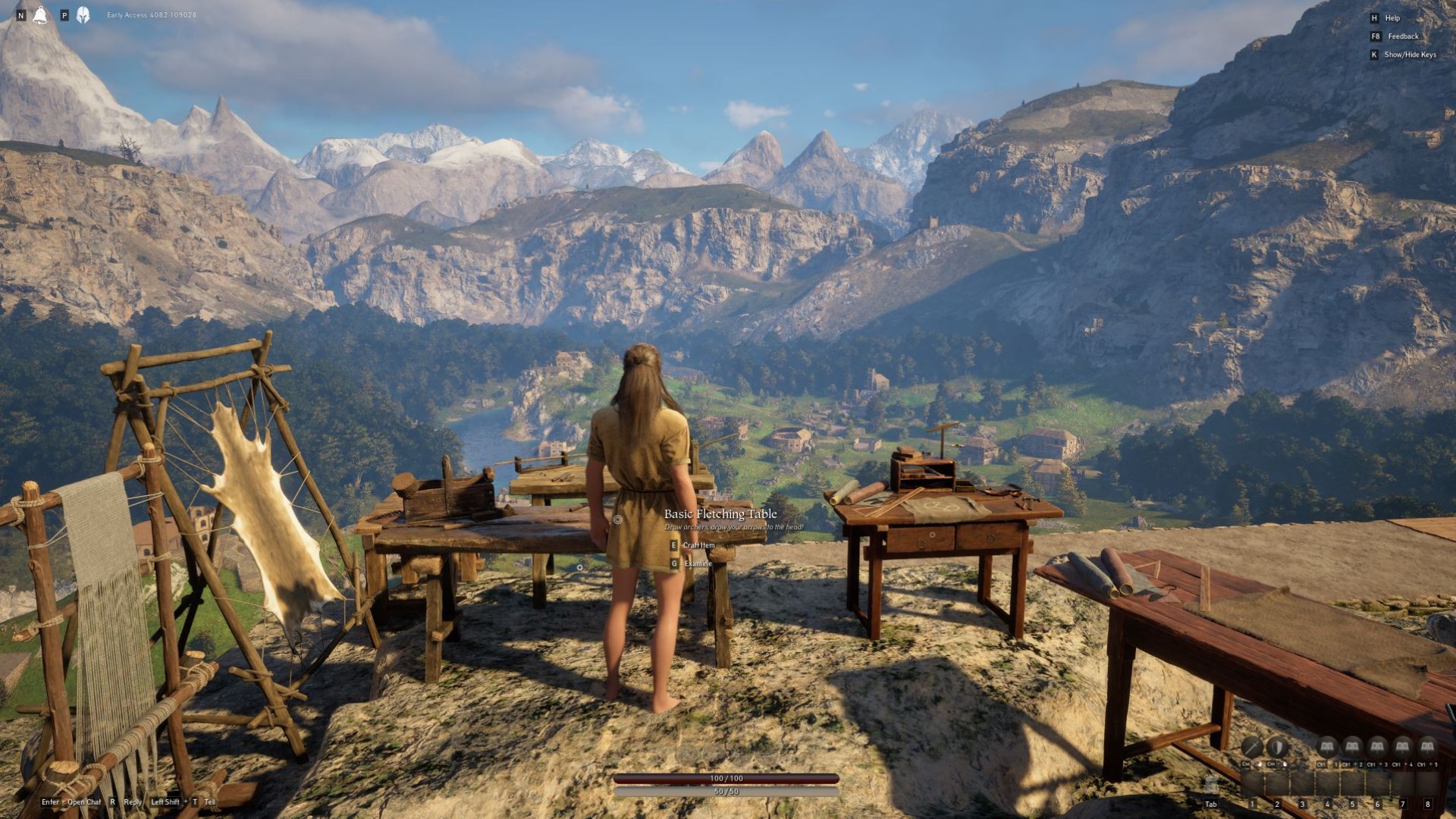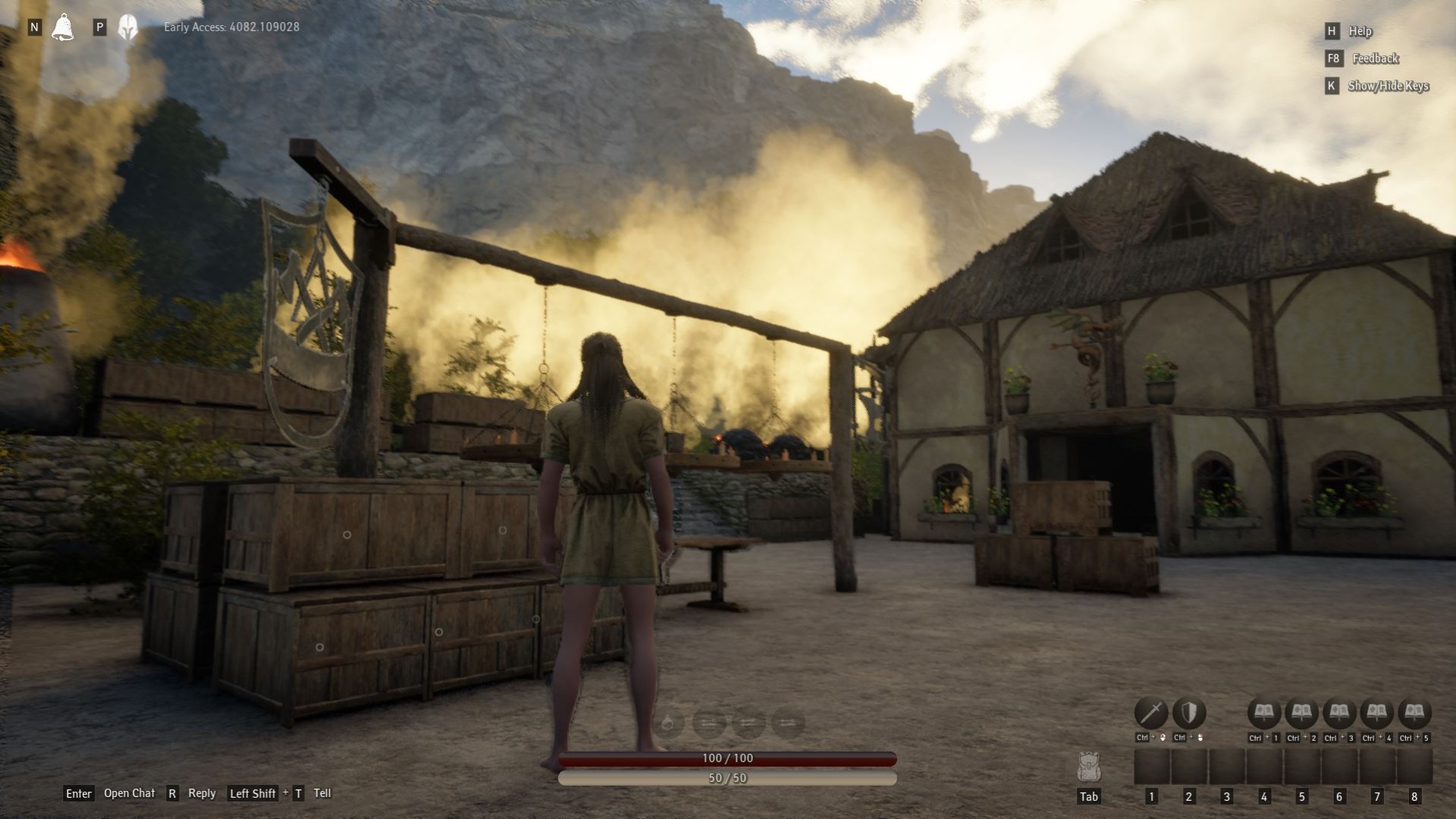The newly released Pax Dei is an undeniably ambitious medieval MMO developed by Mainframe Industries, a team including veterans from Blizzard, Ubisoft, and Remedy. With this pedigree, I’d expected Pax Dei’s early access launch to sit proudly among the year’s top new MMOs, but the reality is a little messier than that.
Developed using Unreal Engine 5, the sandbox game is immediately striking, presenting a vast, unspoiled open world soon to be filled with player-made structures. There are no towns or quest givers to guide you through Pax Dei; rather, it’s up to you to strike out on an adventure, make your own fun, and settle and develop the land.
The initial gameplay loop is similar to crafting-based survival games like Valheim: collect wood, rocks, and metals to forge tools, then build homes, towns, and – eventually – castles and strongholds. As a social sandbox, almost any structure of significant grandeur requires several pairs of hands and good communication to complete. Luckily, the tools at your disposal are generally excellent. The UI is intuitive, and while the game lacks a structured tutorial, it’s never too difficult to get to grips with the basics through experimentation and consulting the menu-based guide. With time and effort, you can build some truly jaw-dropping structures.
This vision of an entirely player-driven world arguably limits Pax Dei’s appeal to the most dedicated genre veterans. Given its focus on building, you’d hope the crafting loop would be up there with the best. The problem right now, however, is the glacial pacing of resource gathering, with it taking many hours just to amass the materials to build even a simple structure solo.

Gathering and harvesting materials is simply not enjoyable right now. Hunting animals is banal, and certain basic actions even lack animations. Collecting meat and pelts from a slain beast results in the carcass simply vanishing into thin air as the spoils of your hunt suddenly appear in your inventory. It might sound like a nitpick, especially given Pax Dei’s early access nature, but when gathering resources takes up so much of your time in-game, these repetitive actions need to feel and look satisfying to perform.
Thankfully, the game’s setting, dubbed the Heartlands, is gorgeous. The lighting is particularly notable, enhanced by realistic textures, dynamic shadows, and detailed foliage. The sunlight cascading over snow-topped mountain peaks creates a sense of awe that Skyrim fans could only dream of. Bodies of water are equally stunning, with morning light dancing off the glistening waves of rivers and lakes, inviting you to take a dip.

I only briefly explored beyond the bounds of the Heartlands, into the wilderness where evil creatures lurk. Here, you can take on rival clans in PVP encounters. The combat is currently basic at best and broken at worst. Melee weapon swings provide no feedback when landing a hit; the only clue that you’re doing damage is seeing the enemy health bar tick down. This means all fights devolve into both parties wildly swinging their weapons, ending in what often feels like a completely random outcome.
Then there are the glitches, which are legion. From corpses hovering above the ground and bits of scenery disappearing and reappearing at random to invisible walls preventing exploration, bugs are inescapable in Pax Dei. Technical issues are expected in an early-access game, but their sheer volume here severely hampers the experience.

If I’m feeling generous, the game resembles a very early alpha build, making the $40 price tag exceedingly hard to swallow. And that’s before we even get into the premium editions, the most expensive of which is $100 and comes with extra character slots and plots of land. The latter offers easier access to rare resources, which has caused some ‘pay-to-win’ complaints from early adopters. Mainframe has confirmed that a monthly subscription fee will be required once the game hits 1.0 sometime next year. Suffice to say, there’s a long way to go before it’s worth that level of commitment.
The lack of polish makes Pax Dei difficult to recommend, even to the most dedicated MMO fans. There’s huge potential here, especially in the crafting and building mechanics, but the average player should hold off until launch or at least until several hefty updates have arrived. I can’t say I enjoyed my time with the game on the whole, but I’m certainly not writing it off, as the foundations are there for something truly great. After all, Rome wasn’t built in a Dei… I’ll see myself out.

